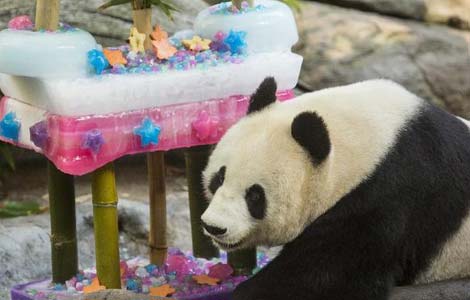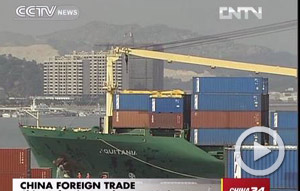To stop ivory poaching, treat it like drug trafficking
Updated: 2013-09-09 10:55
By Chris Davis (China Daily)
|
||||||||
When Kenya's President Uhuru Kenyatta made his first state visit to China last month, one of the several hefty packages he returned with was Beijing's promise to help the East African nation with its wildlife poaching problem.
Kenyatta said the Chinese government offered to help improve surveillance around national parks and game reserves, and "help with capacity building to enable the Kenya Wildlife Service deal with poachers effectively", a press release from the State House in Nakuru read.
The problem, by anyone's numbers, is bad. And it's not just in Kenya. UNESCO recently said "the massacre of wild species has reached an industrial scale, in particular the poaching of animals for their ivory". The UN's Convention on International Trade in Endangered Species says that 30,000 elephants are slaughtered every year for their ivory and could become extinct in 15 to 20 years.
Matthew Lewis, senior program officer with the World Wildlife Fund and a specialist in African species conservation, said that poaching of elephants in Africa is "at the highest levels we've seen since we've been tracking it".
Lewis says that "without question, demand in China has largely driven this increase in elephant ivory poaching. The growth in the economy of China has a strong correlation with demand. The availability of spending money for the average Chinese individual means that ivory as a status symbol is highly in demand in China."
What can China do about it? Lewis thinks it goes way beyond giving money to Africa's anti-poaching efforts. He calls for a much deeper relationship between African governments and China in combating the crime, working very closely hand-in-hand on enforcement issues.
"Certainly money for anti-poaching would be crucial, the rangers need better equipment, better training and more of them," he said. "But follow-up on basic enforcement would be absolutely crucial."

A Chinese individual gets arrested with ivory on the African continent and is given a slap on the wrist or hefty fine, sometimes a sentence, but beyond that nothing. In Lewis' ideal world, the Chinese government would do follow-up investigations, find out who that person is linked to, is he an organized criminal involved with a syndicate? "It's not arresting the poacher that's going to get us over this crisis, it's going to be taking down these large multi-national syndicates of organized criminals with kingpins at their head who are making millions and millions of dollars out of this trade," Lewis said.
Ideally, it would be better to have cooperation at all ends of the chain and track it, detected the ivory in transit then let it go through and set up an ambush at the port and see who comes to pick up the container, and follow that individual back. "It's very similar to the way drug trafficking is investigated," he said.
"If China can cooperate with African governments to get that kind of investigation going, that would be fantastic," he said. "Then we'll start to put a dent in the problem."
He said it is not the highest levels in history because colonialism in Africa was founded largely on the ivory trade. In those days, ivory was used for everything, practically every household product and the development of plastic killed the need for ivory to be used on a day-to-day basis, and reduced demand extensively throughout the 20th century. Elephants recovered fairly well, until the ivory wars throughout the '70s and '80s, when demand was extremely high. That led to a world ban in 1989.
Since then there has been a worldwide effort to track the illegal ivory trade. "What we're seeing now is levels higher than anything we've seen since [1989]," Lewis said.
The forest elephants of Central Africa have declined by 60 percent over the last decade alone. "They are headed for extinction if things don't change," Lewis said. And because that population has declined so drastically, poachers have turned on other populations outside of Central Africa, which is why poaching is on the rise in Kenya, where the elephant population had been rising steadily since the 1980s.
He said last year alone 360 elephants were poached in Kenya alone; this year it's already near that number so it will probably pass it. "It's very alarming, very troubling," he said.
Kenya also said that last year they had lost more anti-poaching rangers than they had at any point in their history. "It's very dangerous for these rangers to combat these highly sophisticated poachers who are making a commercial enterprise out of organized crime," Lewis said, adding that the proliferation of small arms, especially AK-47s make the poachers better equipped than the rangers who go after them.
Contact the writer at chrisdavis@chinadailyusa.com
(China Daily USA 09/09/2013 page2)

 US: Proven link of Assad to gas attack lacking
US: Proven link of Assad to gas attack lacking
 Serena Williams repeats as US Open champion
Serena Williams repeats as US Open champion
 Panda 'Bai Yun' celebrates 22nd birthday in US
Panda 'Bai Yun' celebrates 22nd birthday in US
 Exports expand in Aug amid signs of recovery
Exports expand in Aug amid signs of recovery
 Rodman back from DPRK without jailed American
Rodman back from DPRK without jailed American
 National Games: Pictures of the day
National Games: Pictures of the day
 Abe speech helps secure 2020 Games for Tokyo
Abe speech helps secure 2020 Games for Tokyo
 Djokovic, Nadal set up blockbuster US Open final
Djokovic, Nadal set up blockbuster US Open final
Most Viewed
Editor's Picks

|

|

|

|

|

|
Today's Top News
Xi, Obama discuss Asia-Pacific
Smithfield deal gets panel OK
From DC to Pearl, China-US military ties deepen
DPRK leader has a baby daughter: Rodman
US: Proven link of Assad to gas attack lacking
Li: China pursues sustainable growth
Chinese president arrives in Uzbekistan for visit
China's top admiral visits US
US Weekly

|

|






